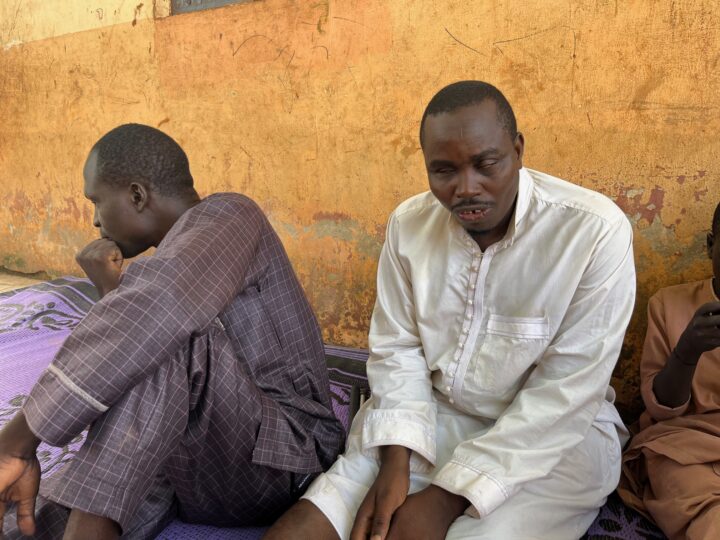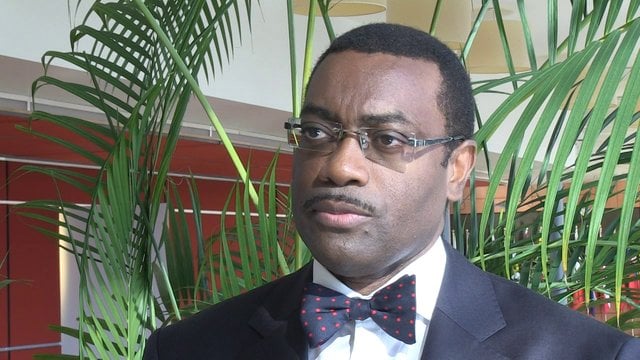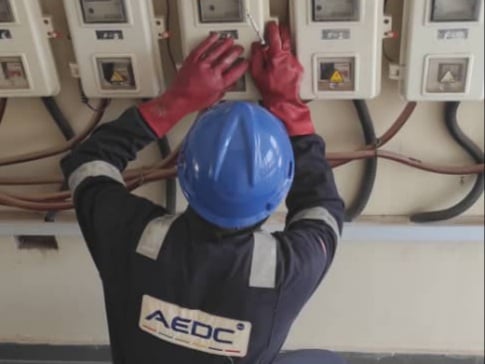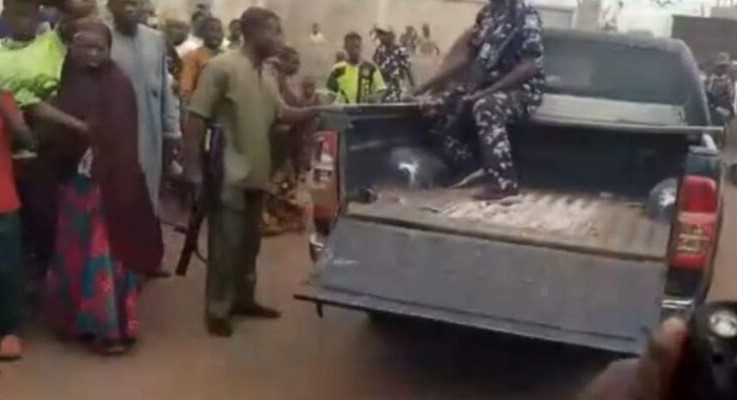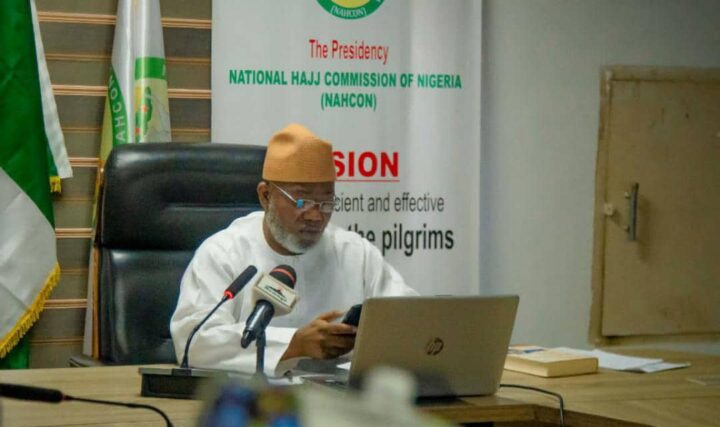Aliyu (R) sitting with Habib, his friend (L). Photo credit: Claire Mom/TheCable
Life before 2009 was blissful for Mohammed Aliyu. He had a home, a job, a car, and most importantly, his sight. Now, none of those things exist.
After Aliyu lost his vision to glaucoma — one of the leading causes of blindness — it did not take long for the Kaduna state local government service commission to swiftly terminate his employment. Soon enough, his other sources of income dwindled and Aliyu would leave his family, who once depended on him, to relieve them of being an extra financial burden.
Tucked kilometres behind the National Military Cemetery (NMC) along the airport road in Abuja, Nigeria’s capital, is Karon-Majigi, a community of persons living with disabilities (PWDs), and it is where Aliyu has called home for the past 14 years.
Known to most locals as Unguwar Guragu (loosely translated from Hausa as a community of disabled people), the settlement is a shelter for over 500 people with different kinds of disabilities tightly knit by the comfort and knowledge of not looking so different from the next person down the street.
Advertisement
A two-part road from the NMC leads to Karon Majigi, each with a stark contrast from the other.
The first part, in what appears to be a tarred road, bears the marks of neglect and wear and tear. Vendors in their cramped shops line the roadside, eagerly trying to sell their wares to pedestrians and motorists. Further down the road, there is a notable change after a roundabout.
An untarred stretch of road filled with potholes of various sizes lies ahead. Rocks, stones and mud complement the rough terrain and are perhaps the reason for the absence of bustling activity as seen in the first part. A primary health care (PHC) centre stands conspicuously by the left and doubles as a signboard to let people who are trying to figure out their location know that they have arrived in Karon Majigi.
Advertisement

About a kilometre away, a physically-challenged person hobbles off and exchanges pleasantries with Aliyu, a visually-impaired man trying to feel around for obstacles as he figures his way home with a guiding cane. In no time, Aliyu finds a clear path but he says it is not so easy when the roads are flooded.
“Every time it rains, the road is flooded and we can’t use the road without a guide because sometimes our mobility sticks do not let us know if there is water nearby or what is inside. In most cases, you have to stick your legs inside the water, but if you have someone guiding you, they can point that out for you,” he says while wiping mucus from his eyes.
Each month, Aliyu travels to Kaduna to be with his family. He tells TheCable he makes these trips alone and is always stranded whenever he returns to a flooded road.
“Sometimes I travel alone and return without a guide. So, when I come back and rain has fallen, I walk in the mud and try to use my leg to feel for dry ground,” he says.
Advertisement

“It makes me so unhappy because what comes to my mind are memories of when I was still sighted. I never had those challenges. I used to see where to put my leg, but now I can’t see anymore. So, I don’t know where to go. If there’s no guide, I have to rely on my stick which is not good in flooded places.”
Although Aliyu has never had an accident from trying to navigate a flooded road, Habib, his friend, has not been that lucky.
He has experienced 10 rainy seasons in Karon Majigi and each one leaves him more shaken than the last.
“I have sustained so many injuries while trying to find my way when the road is flooded and it makes me very sad. Sometimes, when a person is nearby, they give out instructions; but the times when you’re alone, you just have to fend for yourself,” he says.
Advertisement
FAILED GOVERNMENT PROMISES
Between 2003 and 2007, a policy introduced by Nasir el-Rufai, the then minister of the federal capital territory, displaced over 800,000 people from their homes. The policy, the FCT administration said, was part of efforts to restore order to the capital’s master plan. Hundreds of PWDs were affected by this move. To ease the hardship, the former minister evacuated them to Karon Majigi and promised that a permanent site will be set up. To date, the promise is yet to be fulfilled.
Advertisement
Rabiu Mustapha, secretary to the chief of the community for the female PWDs, squeezes her nose in anger while she spoke to TheCable about the failed promise.
In the 12 years she has lived in Karon Majigi, the road has never been fixed and government officials have only visited once.
Advertisement
“They said they will take us from here to our place. Up till now, I haven’t seen anything. They should come and check on us, please. This place is not good. See gutters everywhere. To move from one place to another, we have to climb okada because of the road and if you’re not careful, you’ll fall from the bike,” she says.
“It’s not easy for us, especially for a physically challenged person like me. Before I hop on okada, I’ll first get on this wheelchair which is why it is always spoiling. Look at the way I managed to hold it this morning.”
Advertisement
Her wheelchair is held together with weak twines that look like they are about to rip apart.
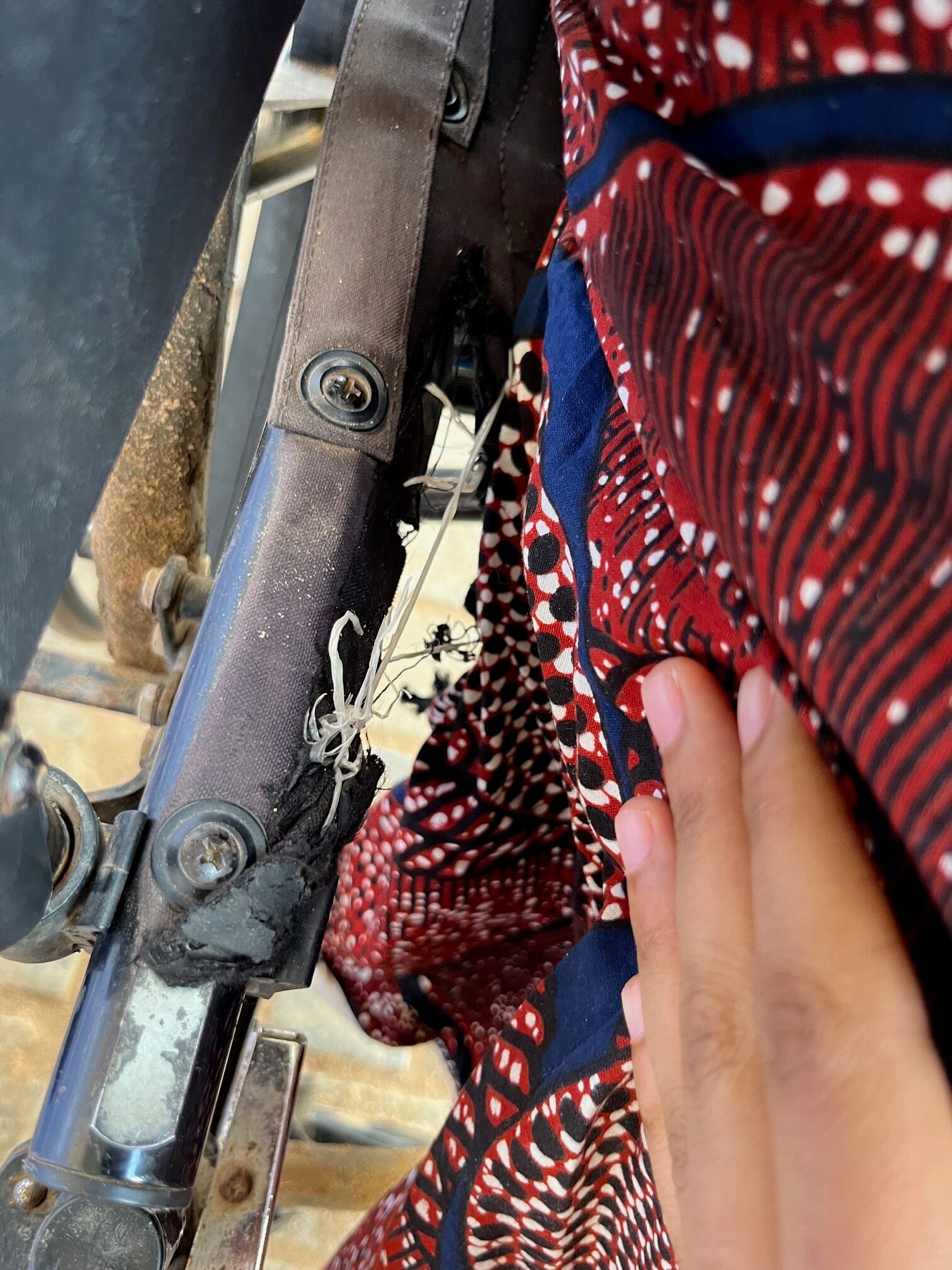
Navigating her way through the rocky terrain of the community has cost her more wheelchairs. She said she lost her ability to walk under strange circumstances when she visited her village. At the time, she was 7; now she is 32.
“I barely changed wheelchairs before I came here, but in the 12 years I’ve been here, it’s uncountable and it is because of our road. Besides, see the way I am; I’m fat. Why won’t the chair be spoiling every week?” she chuckles dryly.

Manual wheelchairs cost between N45, 000 – N300,000 depending on their features, quality, durability, and effectiveness. Mustapha has no job and cannot afford even the low-end ones.
“I repair my wheelchair almost every two weeks. If I don’t have money, I sell my things and pay. Without this wheelchair, I cannot go anywhere. I’ll just sit in one place and I don’t want to be like that,” she says
“Last week, someone gave me a wheelchair and I was contemplating selling the old ones so that I can get money and buy another one and keep it so that I won’t be stranded when it spoils.
LIMITED ACCESS TO MARKET, QUALITY HEALTHCARE
In Unguwar Guragu, petty trade dominates the economic landscape. Mohammed Dantali, secretary to the chief of the community, tells TheCable that the absence of a major market is a driver of the high level of poverty among residents of the settlement.
“Some of our people do business but do not have a market to sell their products. So, we came up with a plan of giving our children whatever we produce to go and sell,” he says.



“Here, it takes time to sell off your commodity. Some here make soap and petroleum jelly, but people don’t patronise us. So, people who want to do business are deterred and have no choice but to beg, maybe when they stretch out their hand, they will get something.
“We’re trying to cope with modern times and produce things accordingly, but if you enter a taxi with an abled person and they look at you with disgust, do you expect them to buy your things?

“People that are fully abled have very good roads, but we that need it the most, those moving on wheelchairs, tricycles, and crawling on their legs are still shedding tears and asking for the road to be at least graded, even if it’s from here to the hospital.
“It’s unfair that our wheelchairs have to keep spoiling or that someone is falling into a pool of mud every time because of a problem that can be fixed.”

Mustapha says she has made efforts to go into town and sell off the liquid soap she makes to a larger market but has been driven away severally by environmental officers.
“Environmental officers have stopped me from selling by the roadside but they allow beggars. I don’t understand why. But I know it will change. They say when there is life, there is hope,” she says hopelessly.
Sometimes, according to Dantali, the PWDs are arrested for encroaching into public space while trying to sell their goods and are taken to prison in Bwari and have to pay huge sums of money for their freedom.
Members of the community rely on their fellow PWDs who are better off financially for contributions so they can stay afloat.
But limited access to a market is not the only thing that keeps the PWDs up at night. Rahina Haruna, women leader of the female PWDs, tells TheCable that pregnant women in labour have a hard time accessing medical facilities speedily because of the nature of the road. They are often forced to give birth at home, supervised mostly by unskilled birth attendants.
“Sometimes, when we manage to get to a hospital, we are turned away and referred to another hospital. Why?” Haruna asked with furrowed brows and a hiss.
HOPES FOR THE PROMISED LAND
In March, Yemi Osinbajo, former vice president, through Mohammed Bello, former FCT minister, presented a certificate of occupancy to the PWD community for a piece of land to accommodate the growing number of residents in Karon Majigi. The move followed years of clamour from the community who demanded better services from the government that displaced them from their homes years ago.
“We had been battling for the place for close to 20 years but God being so kind, the former VP struggled and gave us a place in Tugan Maji, Zuba. It hasn’t even been up to 6 months,” Dantali tells TheCable.
However, one grey area colours the new home the PWDs are looking forward to — it is unclear who will develop the place
“They never mentioned if they will assist us with houses and other infrastructure. That was not made clear and it looks like we are the ones supposed to take that responsibility,” Dantali says while shifting his weight to the other whole leg for balance.
“I don’t know how that will work considering that more than half of us don’t have jobs. If that is the case, it is going to be Karon Majigi all over again and that will just be a transfer of problems.”

Most of the infrastructure in the community — the primary school, mosque, borehole, and skill acquisition centre — are all built by non-governmental organisations (NGOs). Dantali is hoping that they extend their favour to their new land.
But there is only a little non-profit organisations can do to ameliorate the plight of the people without intervention by the government.
Add a comment
